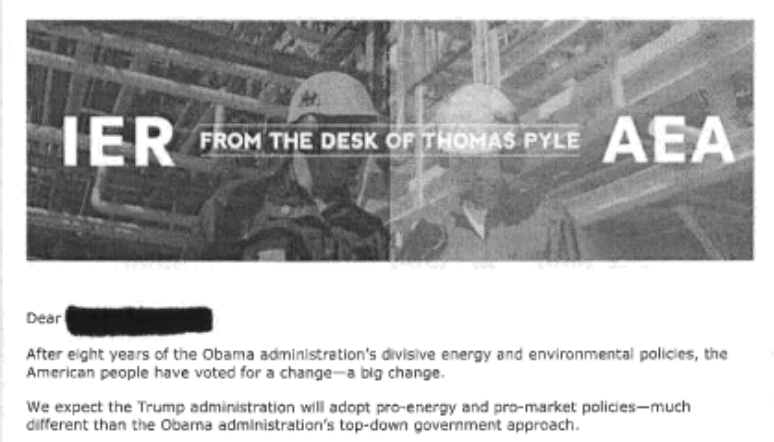The energy agenda of the incoming Trump administration just got a lot clearer. A memo sent by Thomas Pyle, president of the Koch-funded Institute for Energy Research (IER) and head of the Trump transition’s energy team, laid out “The Trump Administration’s Energy Plan.”
The memo, which was received and published by the Center for Media and Democracy, was sent by Pyle to a private email list just days before the Trump team announced that it would replace a Koch lobbyist with Pyle, a Koch-funded former lobbyist, to lead the Department of Energy transition team efforts.
Pyle is the president of both IER and its sister advocacy organization, the American Energy Alliance (AEA), which are both heavily funded by the Koch brothers and their affiliates. Last year, IER and AEA received $3 million from the Koch donor network. Charles Koch was one of the original founders and board members of IER. Pyle’s Koch connections run even deeper, having served as Director of Federal Affairs for Koch Industries from 2001-2005.
The “Trump Administration’s Energy Plan” reads like a fossil fuel industry wish list, including 14 policy proposals such as:
- Withdrawing from the 2015 Paris Climate agreement;
- Increasing federal oil and natural gas leasing;
- Lifting the coal lease moratorium;
- Eliminating the Clean Power Plan;
- Expediting approvals of LNG export terminals;
- Moving forward with pipeline projects including the Keystone XL and Dakota Access Pipeline;
- Rolling back federal fuel economy standards;
- Ending the use of the social cost of carbon in agency rulemaking; and
- Reconsidering the “endangerment finding” that found greenhouse gases to be a threat to public health and welfare.
The memo from Pyle was echoed in a blog post on the AEA website published on Friday, December 2, which lays out “A Blueprint for America’s Comeback” and includes many of the same policy proposals, similarly worded. The entirety of the original memo is uploaded on the ExposedByCMD blog.
Subscribe to our newsletter
Stay up to date with DeSmog news and alerts







